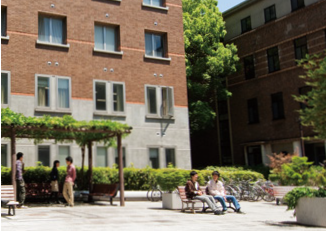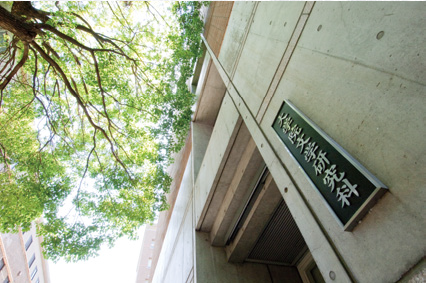- English HOME
- About
- Education at the Faculty of Letters and Graduate School of Letters
Education at the Faculty of Letters and Graduate School of Letters

We encourage students interested in the humanities to develop a clear and wide perspective and think for themselves. In order to gain a broad and deep understanding of any subject within the humanities, the best approach is solid research and rational analysis rather than a reliance on preconceived ideas. Members of the faculty are here not so much to give answers as to think together with the students, encouraging them to develop their own capabilities and cultivate interests that will orient them towards new directions.
Four Years in the Undergraduate Program
Students primarily take general education courses open to all undergraduates in their first year, and then courses offered by the Faculty of Letters from the second year onward. Students are advised to take a wide range of courses during the first year, as those courses will serve as a foundation for later studies. We also recommend that students start learning foreign languages that are necessary in future research at this stage.
Students must choose a specialized field of study from one of the 32 Departments that comprise its six Divisions of the Faculty of Letters. They do so in two stages. First, they choose one of the Divisions in the second year. For this purpose, they are asked to submit applications in the autumn of the first year. Then, they must choose a Department in which to spend their third and fourth years of study. Since making this decision maybe difficult, second-year students can take courses offered by various Departments in order to discover the kinds of research done in the Departments of their Division. They are asked to submit applications for Department enrolment in the autumn of the second year. At this point it is still possible to switch to a Department outside the student’s current Division. It should be noted, however, that the size of each Department is limited and that the candidates are subject to screening.
Specialized training begins in earnest in the third year. Students attend lectures and seminars, some of which are also attended by graduate students. Daily interaction with senior and graduate students will bring them closer to the world of academic research. In order to concentrate as much as possible on their graduation theses in the fourth year, students are advised to amass as many of the credits required for graduation as possible by the end of the third year.
In the fourth year, students are advised to focus on their graduation theses. They are to choose research topics, gather necessary materials, analyze them and organize the results into written theses, operating basically on their own. This process, which may sometimes be arduous, will no doubt prove a valuable and meaningful experience in their chosen careers after graduation. For those who wish to continue their studies at the graduate level, the graduation thesis marks the first step towards a full-fledged research career.

The Graduate Program
The Graduate School of Letters offers a two-year Master’s Program and a three-year Doctoral Program.
Among the benefits given to graduate students is the privilege of borrowing more library books for a longer
period. Some Departments also provide personal desks for their students. Before embarking on graduate
study, first-year students submit research proposals in early April and choose their supervisors. Graduate
students in the Master’s Program are required to obtain 30 credits, a far smaller requirement than that for
undergraduates, so they have enough time to pursue their own research. In order to devote maximum
energy to the master’s thesis during the second year, students are advised to amass as many credits as
possible while in their first year. The title of the thesis, which will likely be a student’s first serious academic
work, must be approved by the head of the Department by mid-October in the second year. We attach great
importance to the thesis in the fundamental belief that it should be constructed upon the work of our predecessors, improve on it, and take it further. A master’s degree is conferred when the thesis has successfully
passed through the evaluation process.

Having entered the Doctoral Program, students will undoubtedly realize that they have now become part of the research communities in their respective disciplines. In some cases, they may even assist faculty members in instructing undergraduates. Although students in the Doctoral Program are under no obligation to obtain credits, they do need supervision in preparing their doctoral theses. They must submit their research proposals for the duration of their entire
program at the beginning of the first year, and plans for the theses at the end of it. In this way their research will progress with systematic precision.











![Kyodai Ibunkai[in Japanese]](../../wp-content/themes/default/images/leftcolumn/bunner/ibun.gif)

![Gakuseishien Project [in Japanese]](../../wp-content/themes/default/images/leftcolumn/bunner/shien.gif)

![Kyoto Gakuha Archive (of Philosophy in Faculty of Letters, Kyoto University) [in Japanese]](../../wp-content/themes/default/images/leftcolumn/bunner/kyoto-gakuha.gif)



